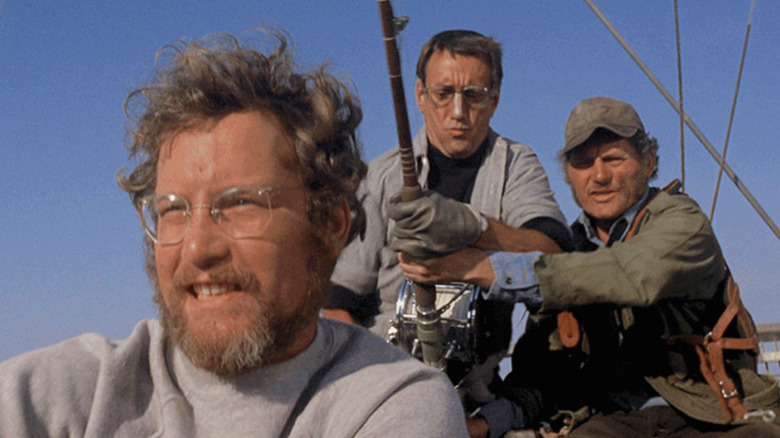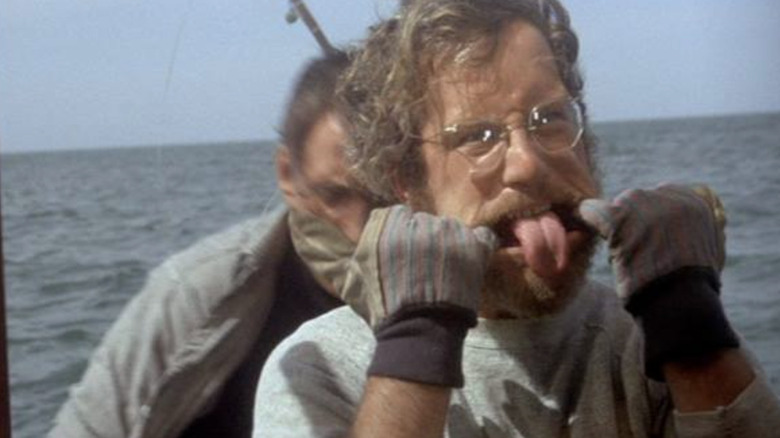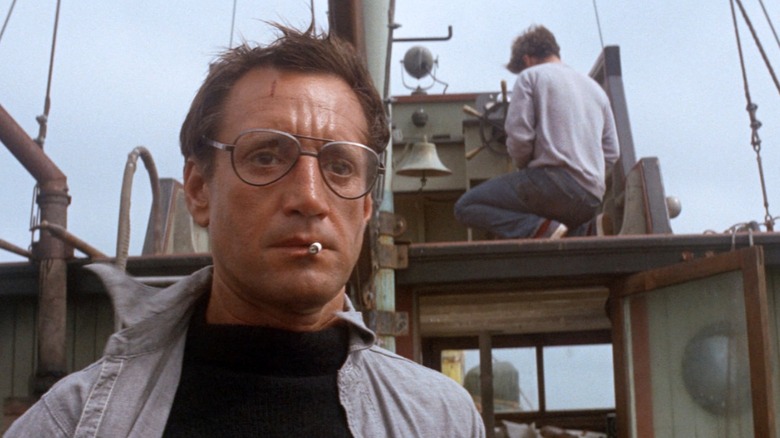Steven Spielberg Says Jaws Got Made For One Simple Reason
"Jaws" is one of those films that has an aura of destiny about it. The movie has become so successful, influential, and beloved that it's impossible to imagine a world without it. When it comes to "Jaws," it feels like some way, somehow, the movie was always going to get made. What's ironic is that, 51 years ago, this was not an opinion shared by almost anyone involved in making "Jaws," up to and including director Steven Spielberg himself. To begin with, the prospect of making a major motion picture out of Peter Benchley's source novel seemed daunting to people even before cameras got rolling, as numerous directors passed on the project before Spielberg was hired. Some of them left for reasons of creative differences, yet others pointed out just how logistically difficult capturing the book's story on film would be. After all, how was one to convince an audience of the veracity of the tale of three men chasing a giant killer great white shark, for by the conventional wisdom of Hollywood in 1974, either the shark would end up looking too laughable (because using real sharks was out of the question) or the sea would look too fake (due to being shot in a tank).
Spielberg, hot off shooting Richard Matheson's "Duel" completely on real desert roads, assumed that he could pull off filming "Jaws" on the open ocean with a mechanical shark. Sure enough, the young filmmaker's ambition turned to hubris, and "Jaws" became a shoot infamous for being rife with production problems. While those issues have been well documented, the question of just how the production was able to overcome these hardships has been less discussed. As part of this year's 50th anniversary celebrations of the film, the Academy Museum will be opening "Jaws: The Exhibition" on September 14th in Los Angeles, and Mr. Spielberg was on hand at a special press preview day to inaugurate the exhibit and deliver some reminiscences on the film. During his speech, Spielberg revealed that "Jaws" made it to theaters for one simple reason: "Nobody wanted to stop." It may sound obvious, but in filmmaking — or any task in life, really — it's a mixture of passion and perseverance that really makes all the difference.
'Jaws' was under threat from seemingly insurmountable elements during filming
Between the numerous articles, interviews, documentaries, and more on the making of "Jaws," most folks know that shooting the film, particularly the third act set onboard the Orca in the middle of the ocean, was no picnic. Yet while many cast and crew members — especially Spielberg — have talked about how grueling the experience was, it's been less discussed how the production was extremely close to being shut down and scrapped for good as a result. As Spielberg recalled during the press event, the film had every reason to be shut down, but it wasn't simply because everyone refused to quit, including himself. "I just really was not ready to endure the amount of obstacles that were thrown in our path," he said. "Starting with Mother Nature ... my hubris was [that] we could take a Hollywood crew, go 12 miles out into the Atlantic Ocean, and shoot an entire movie with a mechanical shark." Spielberg continued, "I thought that was going to go swimmingly. And I had really no idea that the second you tempt Mother Nature and tempt fate, everything starts to conspire against you and us." And it didn't stop there. As he explained:
"And it was what you've read about and what the exhibition kind of suggests: this was a real exercise in hubris and futility. But [it got made] because all of us never wanted to quit, and that was the whole reason we finished the movie. I was offered, actually several times, a chance to gracefully bow out of the film, not to be replaced by another director, but for the film to be shut down. And when we were close to 90 days over schedule, think about that, 90 days over schedule. As it turns out, the film was a hundred days over schedule. We shot 158 days, but nobody wanted to quit. Nobody wanted to stop."
As Spielberg continued, he explained how aspects as simple as keeping a shot clear of unwanted objects and shifting a camera position to frame out invading elements became an absolute chore when shooting on the ocean. While filming "Jaws," there were often sailboats which drifted into frame, causing a debate on whether it would be better to wait for them to go by, or save time by changing the lens size on the camera to get a tighter shot (which would compromise the film's chosen look), or pick up anchor to move the several production boats into a new position. When one considers all the various logistics involved with making "Jaws," it's a wonder it ever got finished at all, never mind the malfunctioning shark.
Everyone got seasick making 'Jaws' except Spielberg
One major obstacle that "Jaws" faced was something that us landlubbers take for granted: stability. Indeed, the motion of the ocean that cast and crew had to endure over hours-long shooting days on a schedule that just kept increasing meant that just about everyone in the production got seasick. As Spielberg explained, this had less to do with simply being out in the middle of the ocean and more to do with the long periods of downtime the production suffered when shooting conditions were poor:
"So most of the time we just waited. People played cards, a lot of people vomited because it was the ocean. I've never seen so much vomit in my life. I haven't. In the six months out to sea, I have never seen so many people getting sick. For some reason, I never got seasick. And I think that is only because I had the weight of this production on my shoulders. I didn't have time to get sick."
Spielberg's anxiety wasn't just about himself, his movie, or the studio's pressures, either, but was also about his crew's lives and well-being. As he explained, a byproduct of the endless (and endlessly difficult) shoot was never being sure when it would end:
"One of the biggest questions the crew kept asking me, and every week I'd have five or six people come over to me to say, 'I have children, I have dependents. I haven't seen them, I haven't seen my family. I've been here for five months. Just give me an incentive to keep working on your movie. Give me a date, a guarantee of when you're going to wrap.' And I didn't know when we were going to wrap until two weeks before we wrapped on Martha's Vineyard. That's how little control we had over the shark, the weather, the currents, the regattas."
In Laurent Bouzereau's "The Making of Jaws" documentary, star Richard Dreyfuss relays a story about how Spielberg deliberately didn't stay in Martha's Vineyard for fear of his crew dumping him in the ocean after it was completed, and the above remembrance helps explain Spielberg's paranoia and guilt about putting people through this experience. Yet soon after, and certainly all these years later, Spielberg recognized that something extraordinary had happened between himself and his crew for the film to get finished:
"The camaraderie that happens when you're trying to survive something. It brought all of us closer together. I've never been closer to a crew or a cast until many years later. But this was the ultimate example that when you work as a team, you can actually get the ball across the finish line. And we did. And I'm very proud of the movie."
"Jaws" is one of the purest cinematic expressions of human perseverance and the ecstasy of survival, and it's no accident. In a way, the people who made "Jaws" had to live through it, and their experience has been immortalized forever for us to share.


